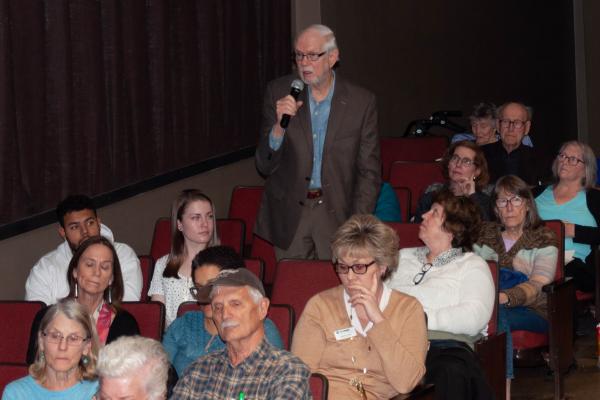
Brain Matters Introduces Local Audience to the 'Miracle Years' of Early Childhood
On March 9, 2020, the UNC Frank Porter Graham Child Development Institute hosted a free screening of the documentary Brain Matters in partnership with Carolina Public Humanities, introducing an interdisciplinary audience to the science of early childhood development and how early experiences impact individuals across the lifespan.
The documentary features researchers, scientists, economists, families, and educators from around the world, exploring the "miracle years," the impactful first few years that shape brain development.
"We know that early experiences carry through early life into adolescence and adulthood," said Ayse Belger, PhD, director of FPG and professor and director of neuroimaging research in the Department of Psychiatry. "This documentary shows how we've been a part of that science."
The documentary features commentary from former FPG investigators Craig Ramey, PhD, and Joseph Sparling, PhD, co-creators of FPG's legendary Abecedarian Project, one of the world's oldest and most oft-cited early intervention programs that continues to demonstrate the importance of high-quality early care and education. The documentary highlights the measurable impact the project has had on the lives of the vulnerable and at-risk children who participated into their adulthood.
"Children who get a really good, solid early childhood education foundation are more likely to continue their education when they leave high school, they're more likely to go to college, they are four times more likely to graduate from college, and they are more likely to get highly skilled jobs that pay more," states Ramey in the film. "They are actually healthier as adults."
Frequent, intentional high-quality interactions between adults and young children increase their chances to be happy and thrive. The documentary covers the four things young children need to build a quality foundation:
- Responsive and nurturing parents and caregivers
- Rich language
- Proper nutrition
- Play
Kendra Alston, now a teacher and owner of a successful teacher training program, was enrolled in the Abecedarian Project at birth and went on to become the first in her family to obtain a master's degree. The project also had a positive impact on her mother Judy Alston Hunter, who became a parent as a teenager and now works with students in the General Education Development (GED) program at Durham Technical Community College. The two shared their story, and how the project shaped their lives, with the film.
"They enhanced my maternal skills," Hunter tells the film.
Following the film, Ronald Seifer, PhD, FPG's associate director for research, and Belger led an audience discussion.
"One of the things FPG is really doing well in respect to early childhood development is finding real ways to move research to practice and policy. We're working to identify the things that work for young children, and the things that don't work, so we can bring that to our policymakers and help practitioners implement high quality-interventions our children need," Seifer told the audience.
